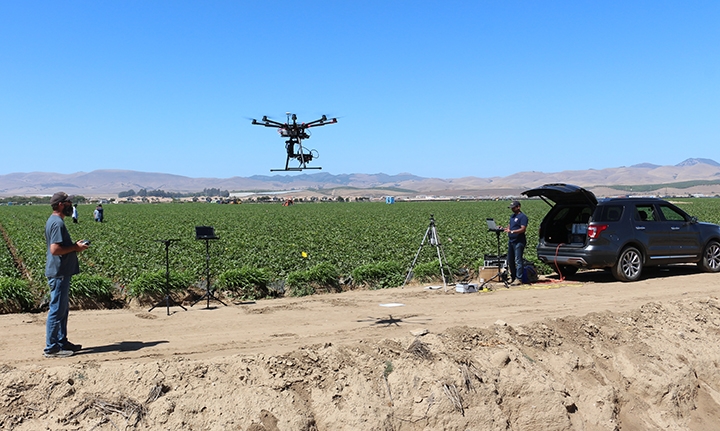Dec 11, 2020FAA drone policy to include input from agriculture
The U.S. Senate passed bipartisan legislation introduced by U.S. Senator Gary Peters, D-Michigan, to ensure the Federal Aviation Administration (FAA)’s chief drone policy committee includes representation for agriculture, forestry, and rural America.
According to a news release, the Drone Advisory Committee for the 21 Century Act, which Peters introduced with Senators John Thune, R-South Dakota, and Pat Roberts, R-Kansas, who serves as the Chairman of the Senate Agriculture, Forestry, and Nutrition Committee – would ensure that the FAA provides representation for local government officials, including those from county and tribal governments, on the Drone Advisory Committee (DAC). This marks the 13the standalone Peters bill to pass the Senate since 2019, the most of any Senator from either party.
“With drones becoming integral to Michigan farms and businesses, it’s important that farmers, and rural representatives have a seat at the policy making table – especially when it impacts their bottom line and as they deal with unprecedented challenges related to this unprecedented public health and economic crisis,” said Peters, a member of the Senate Commerce, Science and Transportation Committee. “I am pleased that the Senate has passed this commonsense bipartisan legislation that will help ensure that agriculture, forestry and rural perspectives across the state are taken into account before new regulations are developed.”
“As technology becomes more sophisticated, farmers will increasingly rely on drones to assess, monitor, and manage their farm activities,” Thune said. “Rural areas like South Dakota – where agriculture is the state’s top industry – deserve to have a seat at the table when it comes to making decisions on drone policies and best practices. I’m pleased the Senate passed this bill to ensure representation from rural areas on the Drone Advisory Committee.”
“Drones are another tool in the toolkit for agricultural producers to run a more sophisticated and efficient operation,” Roberts said. “I’m proud this bipartisan legislation gives farmers a seat at the table when decisions are being made about drone policies.”
“Drones have become an integral part of farming across the country, providing timely and precise agronomic information to guide crop protection and nutrient application management decisions that maximize yields and minimize environmental impact,” said Carl Bednarski, president, Michigan Farm Bureau. “As more farmers adopt drone technology, Senator Peters’ bill will give farmers a seat at the table to help shape the best policies for an ever-evolving industry, and ultimately to help farmers stay competitive in a global economy. We appreciate Senator Peters’ leadership on this issue and applaud the entire Senate for approving it.”
“Drones play an important role in many rapidly-advancing technologies used by farmers and agribusinesses, so it’s important to have agriculture at the table when the federal government considers drone policies,” said Chuck Lippstreu, President, Michigan Agri-Business Association. “As our members across Michigan deploy groundbreaking new applications for drones, we appreciate U.S. Senator Gary Peters for his bipartisan leadership to help ensure the FAA takes agriculture into the equation on drone policies.”
The Drone Advisory Committee for the 21st Century Act would encourage public participation in the nomination process to increase broader user representation on the DAC, and would emphasize transparency requirements to ensure that the DAC’s work becomes part of the public record.
Since it was first announced in 2016, the DAC has never included a representative from the agriculture or forestry sector and no representatives from county or tribal governments have been selected to the policy board. In 2017, complaints were raised about the committee’s transparency. In June, Senator Peters and the Chairman of the Senate Commerce, Science and Transportation Committee Roger Wicker wrote to the FAA to request broader representation on the Committee for the agriculture, forestry, and rangeland sectors.
The legislation has the support of a number of organizations, including the Rural & Agriculture Council of America, American Forest Foundation, Michigan Forest Foundation, American Farm Bureau Federation, National Farmers Union, National Association of Corn Growers, United Egg Producers, U.S. Cattlemen’s Association, American Dairy Coalition, Michigan Corn Growers Association, National Association of Counties and the Michigan Farm Bureau.
Peters has long supported efforts in Congress to support Michigan farmers. This past March, bipartisan legislation Peters introduced to address the shortage of agricultural inspectors who protect the nation’s food supply and agricultural industry at the border was signed into law. Peters has also been a leading voice in support of efforts by cherry growers across Michigan to prevent foreign competitors from deploying unfair trade practices, including dumping and subsidies on imported goods.

















